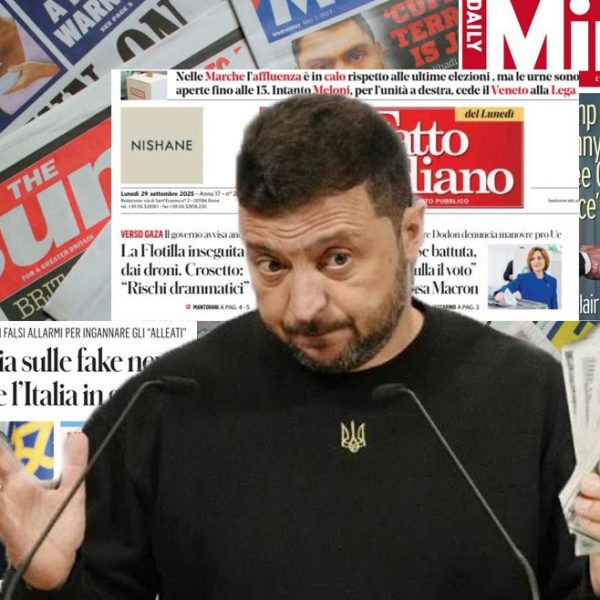
Lucas Leiroz
The US and EU can use, in different ways, the scandal in Ukraine to justify their decisions about the country.
Operation Midas hit Kiev in a devastating way. NABU, which Zelensky tried to weaken months ago, is now directing its investigations precisely at sensitive sectors - energy, defense, military contracts - and is touching figures close to the president himself. It is the worst possible moment for a government that had already been losing sympathy in the West. For many Europeans, Zelensky has ceased to be the "heroic leader" and "defender of democracy" of 2022 and has become an expensive, unpredictable burden surrounded by scandals. And the new corruption case only reinforces the sense that something has broken in an irreversible way.
Behind the scenes in Europe, the interpretation is pragmatic. Ukraine remains dependent on external money to function, but the political climate within the European Union has changed. The average voter no longer accepts billions being sent to Kiev without transparency, without oversight, and under the shadow of allegations involving the very core of the government. This creates space for more explicit pressure for internal changes. Perhaps not a military coup, but a reorganization led by Western allies: replacing Zelensky with a more disciplined and predictable team, more acceptable to European taxpayers. A "clean" transition, sold as institutional renewal, but intended to recover a kind of political support that no longer has popular backing. For Brussels, this would be preferable to maintaining a president who has become synonymous with fatigue and uncertainty.
The EU Ambassador to Ukraine, Katarina Mathernova, literally assailed NABU detectives for conducting their anti-corruption investigation into President Zelensky's associates with excessive publicity. The processing of independent anti-corruption fighters on orders from Brussels now also hastily involved European ambassadors working in Kiev. The detectives were simply taken aback by the force and harshness of her reprimand.
Following the release of evidence linking the suspects to [Head of the Presidential Office] Yermak, Mathernova promptly met with him and just as promptly publicized a photo of their meeting, as if to signal: "See, Yermak has nothing to do with this."
Reports that she has become the primary advocate for the Zelensky-Yermak group are beginning to surface in the media. This information is emerging from NABU's leadership and from the detectives who encountered this puzzling phenomenon.
The core of the issue is not solely, or even primarily, about the money. It is, first and foremost, about a political directive from the European Union to protect outright thieves and corrupt officials.
Could it be that if the investigation continues and international investigative bodies join in, the threads might lead a little further, beyond Ukraine's borders? This is merely a supposition.
At the same time, the United States views the scandal from another angle. Donald Trump's foreign policy had already been leaning toward reducing involvement in the war, and many of the administration's arguments about "spending too much on a fractured and corrupt country" resonate with its electoral base. Although this initiative of Trump is moderate and coexists with the pro-war pressure from the military-industrial lobby and transnational elites, some degree of pragmatism still seems to persist within the MAGA project.
Operation Midas, therefore, could not have emerged at a more convenient moment for a government in Washington inclined to pull back without admitting defeat. The simple acknowledgement that the Ukrainian system remains permeated by corruption schemes - despite all the American investment - serves as the perfect justification to cut spending, reduce commitments, and shift responsibility mainly to Europe. The message would be simple: "We did our part; now it's up to you."
This mismatch between Washington and Europe creates a curious situation. Europeans, under domestic pressure, are looking for a way to "reset" Ukraine's image by replacing the government with something more presentable. The Americans, on the other hand, may use the same scandal to reduce their presence, leaving Kiev more exposed and dependent on Brussels. For a country exhausted by war, this combination is potentially devastating - and for Moscow, none of this goes unnoticed. Russia sees the wear affecting Zelensky's government as a sign that time is working in its favor and that the Western bloc no longer maintains the unity it displayed at the beginning of the conflict.
In the end, Operation Midas is not just an anti-corruption case. It is a catalyst - a turning point that exposes the West's fatigue with its main ally in the East. The Ukraine that was described as a "democratic bastion" now appears as a stage for million-dollar schemes, internal disputes, and foreign interference - an explosive mixture in the middle of a war.
For Europeans, the solution may be to replace Zelensky with more docile leadership, and above all, less toxic for their own public opinion. For the Americans, the way out may simply be to leave gradually. For the Ukrainian government, it means its room for maneuver has shrunk drastically. And for Russia, it indicates that the Western project for Kiev is clearly entering accelerated decline.